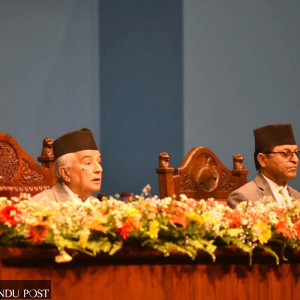
Government's policies and programmes disappoint the Dalit community presented by President Ramchandra Paudel presents government's policies and programmes at parliament on Friday
Kathmandu
Prime Minister Pushpa Kamal Dahal, while addressing a function to mark the day against racial discrimination on March 21, promised that his government would announce a plan that the Dalit community will remember forever.
But the Dalit members who were elated by the prime minister’s promise were dejected when they saw the government’s policies and programmes presented by President Ramchandra Paudel on Friday.
Leaders, experts and activists of the Dalit community have expressed disappointment at the new policies and programmes saying that they offer nothing to them.
They had great expectations from a ‘revolutionary’ leader like CPN (Maoist Centre) chair Pushpa Kamal Dahal, who leads the coalition government, to come up with policies meant for their community but to no avail.
“Actually, I expected something to help implement two Articles of the constitution—Article 24, which talks about ending untouchability and Article 40, which speaks about Dalit’s rights,” said Hira Bishwokarma, a Dalit activist and writer. “But the prime minister, once a revolutionary leader, seems to have changed after his labeda suruwal avatar.”
Dahal, who was never seen wearing daura suruwal, first wore the national dress when he was sworn in as prime minister in December last year.
Bishwokarma said the government appears uninterested in implementing the fundamental rights guaranteed by the country’s constitution.
The 35-page policies and programmes mentioned the word Dalit only in two places, embedding it with other various groups.
Point 118 of the policies states that the government will carry out economic and social development programmes to support income generation, capacity development and empowerment of the underprivileged—poor and disadvantaged, Dalits, indigenous people, single and disabled women, Badis, Kamlaris, Kamaiyas, Chepangs, Botes, victims of violence, gender and sexual minorities, and HIV-infected people, as well as deprived women and girls of all communities.
Meanwhile, point 126 pledges to increase access to quality education at the grassroots and to launch special programmes for Dalits, minorities, endangered communities, economically disadvantaged and disabled children and those from backward, remote and mountainous areas.
“An arrangement will be made for the distribution of all scholarships in the education sector through a one-door system,” the government states. “Scholarships aimed at the disadvantaged will be expanded. The mid-day meal programme will be gradually expanded.”
Dalit activists were also angry because Prime Minister Dahal, who waged a decade-long people’s war that saw a large number of Dalits killed, had promised to come up with an impressive programme to uplift the community.
Rastriya Swatantra Party Chief Whip Santosh Pariyar said the policies and programmes have let down the Dalit community that expected progressive steps from the government.
“The policies and programmes have nothing special, not only for Dalits but also women and Madhesis,” said Pariyar. “This government was not serious about giving respite to the communities that were historically oppressed.”
Pariyar said the government should have come up with specific policies to improve the conditions of the weaker sections of society including Dalits. “The authorities should have listened to experts on various issues while drafting the policies but no suggestions have been incorporated into the annual programmes.”
As the budget for the new fiscal year will be based on the policies and programmes, Dalit experts say they are not hopeful about the government allocating funds for programmes benefitting the downtrodden community.
The Maoist Centre in its election manifesto had pledged to launch a nationwide campaign against untouchability.
But the governing coalition led by the party seems to have forgotten the promise.
Bishwokarma claimed that the downtrodden communities now can’t expect anything from Dahal, who was once seen as a revolutionary leader.
Even the Dalit leaders and lawmakers from the Maoist Centre were unhappy about the exclusion of the community from the policy document.
“There is no Dalit representation in the Cabinet. So what can we expect?” said Anjana Bishankhe, a Maoist leader and former lawmaker. “The policies and programmes were far from what we expected.”
She said the inclusion of policies related to the Dalit community was extremely difficult and even if something is included, its implementation is tough.
Prior to the promulgation of a new constitution in 2015, activists pressed the governments to address the issues of minorities and underprivileged communities like Dalits. But activists and leaders say the governments formed after the country adopted federalism have started to put their issues low on priority.
Durga Sob, founding president of the Feminist Dalit Organisation and a leader of the Nepal Samajbadi Party, said it was depressing that recent governments have given less priority to Dalit issues.
“The essence of development is to give priority to the communities at the bottom,” Sob told the Post. “But things are quite different now.”












